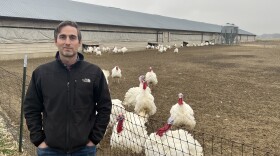WYSO is home to one of the only agriculture reporters in Ohio, whose works includes news on farming policy and data.
-
The destructive insect has been destroying boxwoods in many parts of Ohio. One landscape nursery said it has been pouring funds into keeping its plants safe.
-
Ohio’s General Assembly reduced funding to the H2Ohio program in June. The program is designed to protect the state's fresh water from toxic algal blooms and other threats.
-
Ohio's turkey industry brings in over $153 million for the state, setting it at 8th in the nation for turkey production with 273,280,000 pounds produced annually.
-
State Rep. Levi Dean of Greene County is sponsoring House Bill 406 to legalize the sale of raw milk in Ohio with some regulations. The Ohio Dairy Producers Association opposes it.
-
The initiative, known as Operation Evergreen, is a partnership between the Ohio Department of Agriculture and the Ohio Christmas Tree Association.
-
After nine years of service as a Clark County Commissioner, Melanie Flax Wilt will step down from her seat to prioritize her family, health, business and volunteer work.
-
Over the last 15 to 20 years, China has been the number one importer of soybeans from the U.S. Now, they have cut their purchasing power to zero.
-
A new agreement further enhances Ohio’s long-standing agriculture relationship with Taiwan. This latest agreement will generate an estimated $6.4 billion over three years.
-
The Ohio Department of Agriculture says producers in the state destroyed more than 15 million birds in the latest outbreak; At one point, Ohio had the most cases of bird flu in the country. The latest case was on April 14.
-
Farmers across the state are having to pivot from drought conditions last year to heavy rainfall that has forced many to replant crops.
-
Sheehan Brothers Vending is headquartered in Springfield and has recalled a number of its vending and mini market products after an Ohio Department of Agriculture inspection found undeclared sesame allergens in some of its food.
-
Darke County is the center of Ohio's egg industry and its poultry farmers have been particularly hit hard. This loss drew Gov. Mike DeWine and other state and industry leaders out Thursday afternoon.











